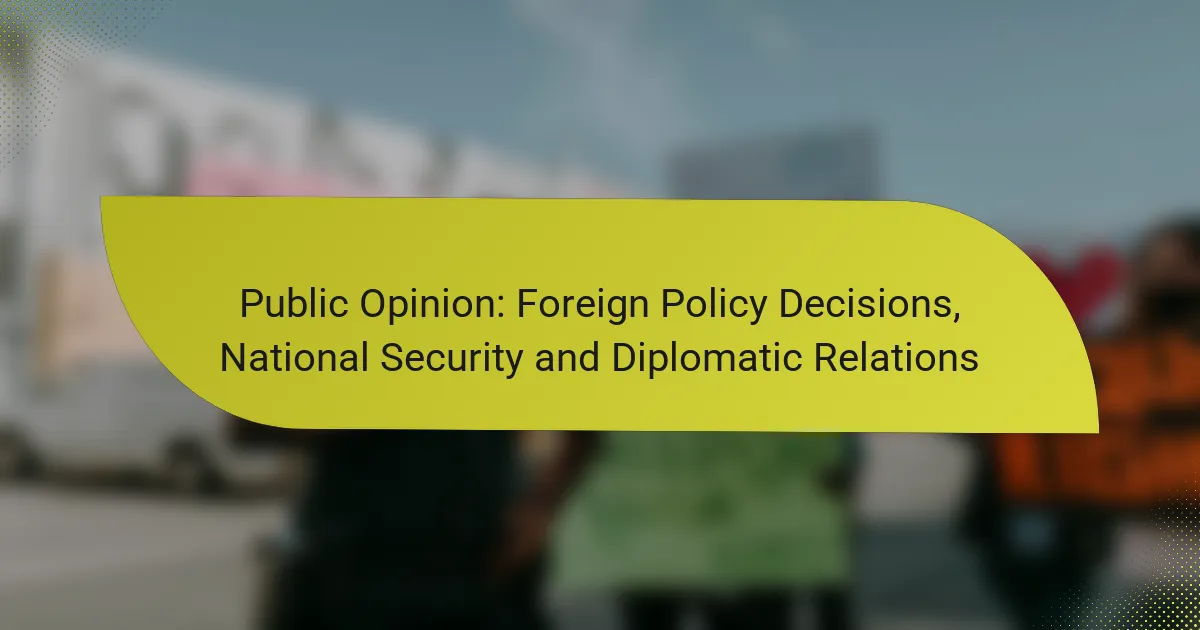Public opinion plays a crucial role in shaping foreign policy decisions, particularly in the United States, where political leaders often align their strategies with the sentiments of their constituents. As citizens express strong views on international issues, these perspectives can directly influence national security strategies and diplomatic relations, compelling policymakers to prioritize public support. Understanding the interplay between public sentiment and foreign policy is essential for comprehending how governments navigate complex global challenges.
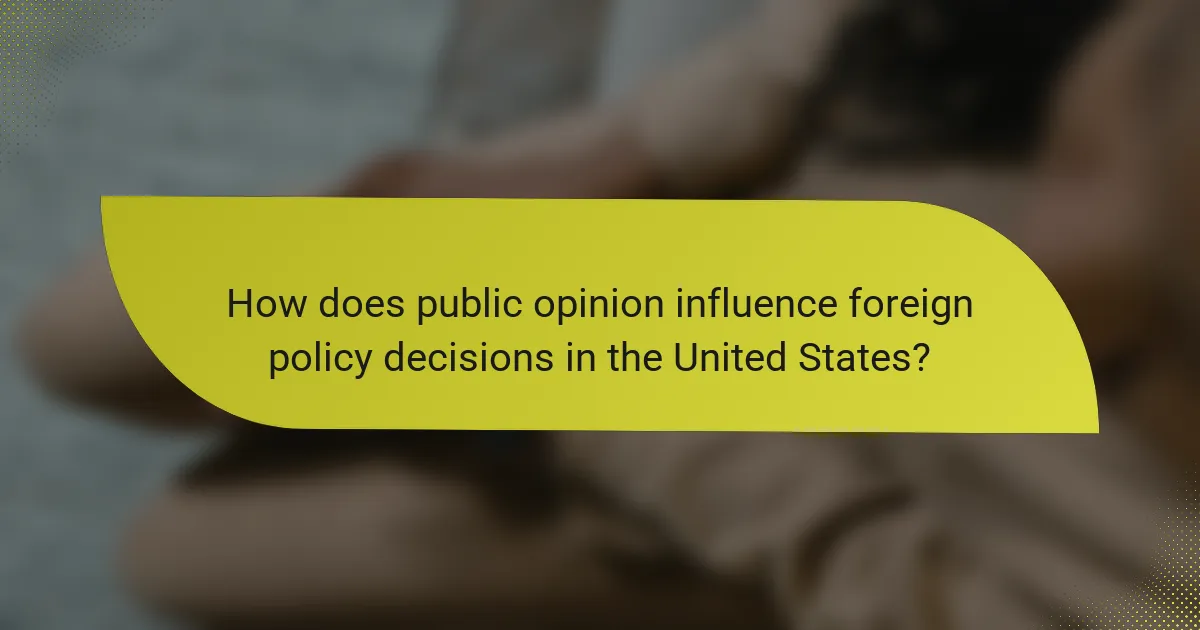
How does public opinion influence foreign policy decisions in the United States?
Public opinion significantly shapes foreign policy decisions in the United States by affecting political leaders’ actions and priorities. When a substantial portion of the population expresses strong views on international issues, policymakers often feel compelled to align their strategies with these sentiments to maintain support and legitimacy.
Impact of public sentiment on policy-making
Public sentiment can drive foreign policy by influencing elections, legislative actions, and executive decisions. Politicians often gauge public opinion through polls and focus groups, using this data to craft policies that resonate with voters. A notable example is how public outcry against military interventions can lead to a reevaluation of such strategies.
Moreover, social media has amplified the impact of public sentiment, allowing citizens to voice their opinions rapidly and widely. This can create pressure on leaders to respond to emerging issues, such as humanitarian crises or international conflicts, in a manner that aligns with public expectations.
Case studies of recent foreign policy shifts
One prominent case is the shift in U.S. policy towards Cuba, where changing public attitudes over the years led to a thaw in relations. Increased support for engagement with Cuba among the American public prompted the Obama administration to take significant steps towards normalizing diplomatic relations.
Another example is the response to the Syrian refugee crisis. As public concern grew over humanitarian issues, many U.S. states began advocating for increased refugee admissions, influencing federal policy to accommodate more refugees than initially planned. These cases illustrate how public opinion can directly alter the course of foreign policy in the U.S.
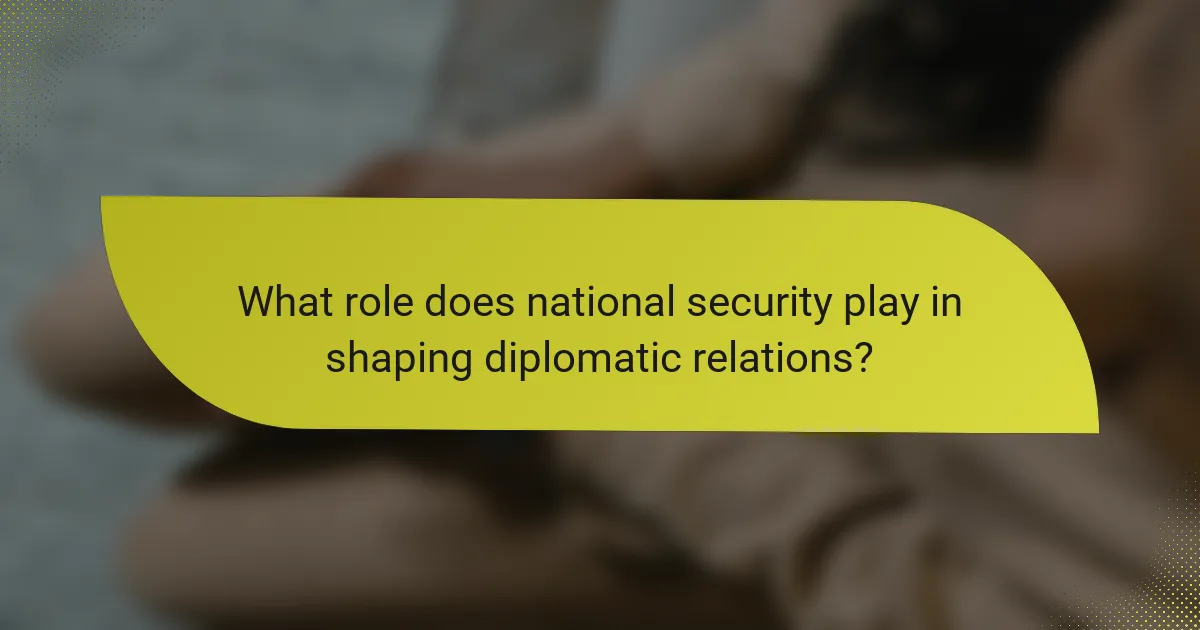
What role does national security play in shaping diplomatic relations?
National security is a critical factor in determining how countries interact with one another, influencing diplomatic strategies and alliances. Governments prioritize the protection of their citizens and interests, which often leads to foreign policy decisions that reflect security concerns.
National security as a primary concern
National security serves as a foundational element in the formation of diplomatic relations. Countries assess threats from other nations, terrorism, and economic instability, which can dictate their foreign policy approaches. When national security is at stake, governments may adopt more aggressive or defensive stances in international negotiations.
Additionally, national security considerations can lead to the establishment of military alliances, trade agreements, and intelligence-sharing partnerships. These relationships are often designed to bolster a nation’s defense capabilities and enhance collective security.
Examples of security-driven diplomacy
One prominent example of security-driven diplomacy is NATO, where member states collaborate on defense strategies to deter potential aggressors. This alliance emphasizes mutual defense, meaning an attack on one member is viewed as an attack on all, thereby enhancing collective security.
Another instance is the U.S. approach to relations with countries in the Middle East, where security concerns regarding terrorism and regional stability have led to military aid and strategic partnerships. These relationships often prioritize security cooperation over other diplomatic considerations.
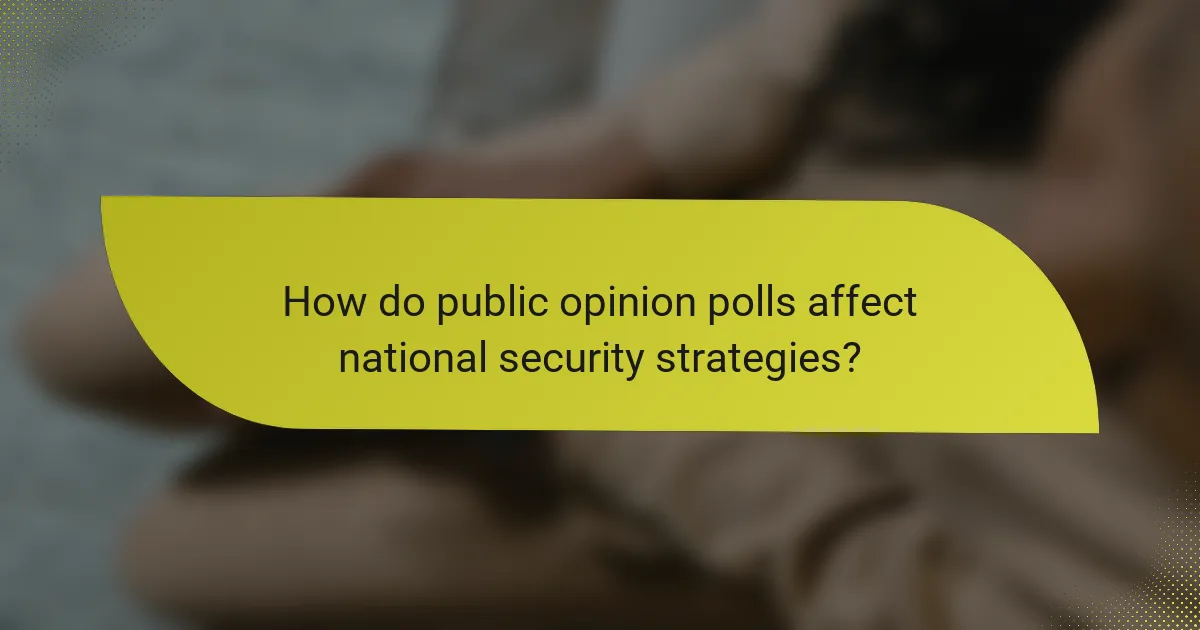
How do public opinion polls affect national security strategies?
Public opinion polls significantly influence national security strategies by providing insights into citizens’ attitudes toward military actions and defense policies. Policymakers often rely on this data to align their strategies with public sentiment, ensuring broader support for their decisions.
Polling data guiding defense policies
Polling data serves as a critical tool for shaping defense policies by revealing public priorities and concerns. For instance, if polls indicate strong support for increased funding in cybersecurity, defense agencies may allocate more resources to that area. This responsiveness helps maintain public trust and ensures that policies reflect the electorate’s values.
Moreover, trends in polling data can signal shifts in public opinion that necessitate policy adjustments. For example, a growing concern about international terrorism may prompt a government to enhance counter-terrorism measures, reflecting the urgency expressed by the populace.
Influence of public perception on military actions
Public perception plays a vital role in determining the timing and nature of military actions. When citizens express strong opposition to military intervention, leaders may hesitate to engage in conflict, fearing backlash or loss of support. This dynamic can lead to more cautious approaches in foreign policy.
Additionally, successful military operations often rely on favorable public perception to sustain long-term support. For example, a well-received humanitarian mission can bolster public approval, making future military engagements more politically viable. Understanding this relationship is crucial for leaders aiming to navigate complex national security landscapes effectively.

What are the key factors affecting public opinion on foreign policy?
Public opinion on foreign policy is shaped by various factors including media coverage, political leadership, and the prevailing social context. These elements influence how citizens perceive international relations and national security decisions.
Media coverage and its effects
Media coverage plays a crucial role in shaping public opinion on foreign policy by framing issues and highlighting specific narratives. For instance, extensive reporting on a conflict can lead to heightened public concern and pressure on policymakers to act.
The tone and perspective of media outlets can also sway public sentiment. A predominantly negative portrayal of a foreign policy initiative may result in decreased support, while positive coverage can bolster approval ratings. Citizens often rely on major news sources for information, making media bias a significant factor.
Political leadership and messaging
Political leaders significantly influence public opinion through their messaging and communication strategies. Clear, consistent messaging about foreign policy goals can foster public trust and support. Leaders who effectively articulate the rationale behind their decisions are more likely to gain public backing.
Conversely, mixed messages or perceived indecisiveness can lead to skepticism and opposition. For example, if a government announces a military intervention but fails to explain its objectives, public support may wane. Engaging with constituents and addressing their concerns can enhance the legitimacy of foreign policy decisions.
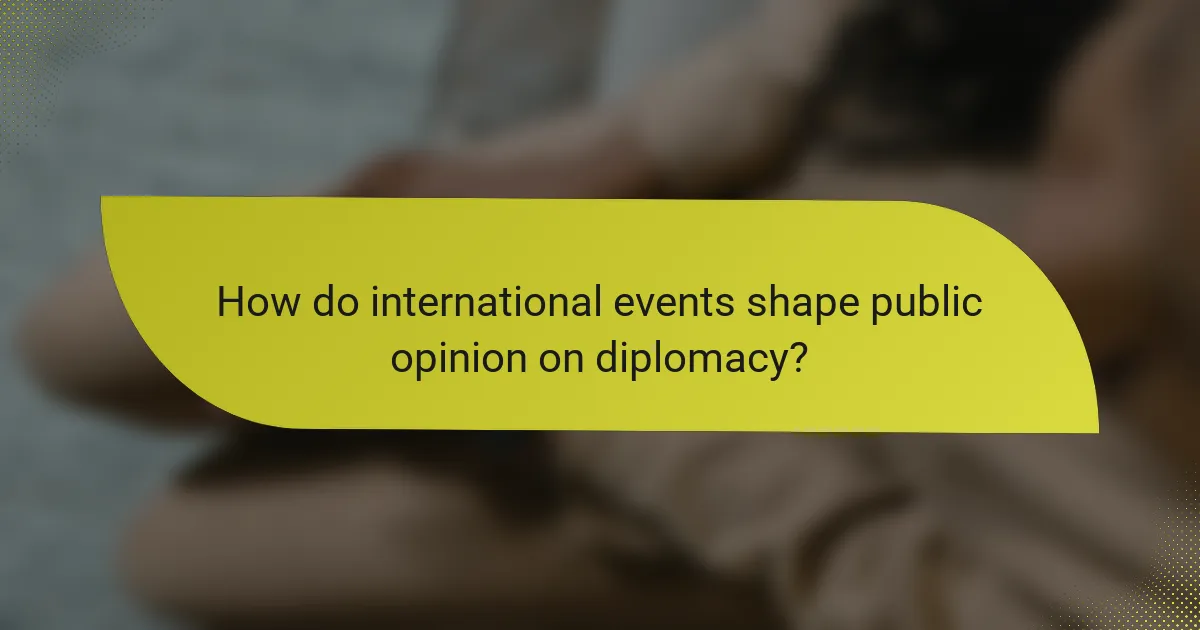
How do international events shape public opinion on diplomacy?
International events significantly influence public opinion on diplomacy by altering perceptions of national security and the effectiveness of foreign policy. As global crises unfold, citizens often reassess their government’s diplomatic strategies and responsiveness to international challenges.
Responses to global crises
Public opinion tends to shift rapidly in response to global crises such as wars, natural disasters, or humanitarian emergencies. For instance, a military conflict may lead to increased support for interventionist policies, while a natural disaster might prompt calls for humanitarian aid and international cooperation.
Governments often gauge public sentiment during these events to adjust their diplomatic approaches. Effective communication and transparency can enhance public trust and support, while perceived inaction may lead to criticism and calls for policy change.
Influence of international relations on domestic views
The state of international relations can significantly shape domestic views on diplomacy. For example, positive relations with key allies can bolster public confidence in foreign policy, while tensions with other nations may foster skepticism and fear.
Media coverage plays a crucial role in framing these perceptions. When the media highlights diplomatic successes or failures, it can sway public opinion, either reinforcing support for current policies or prompting demands for a reevaluation of diplomatic strategies.
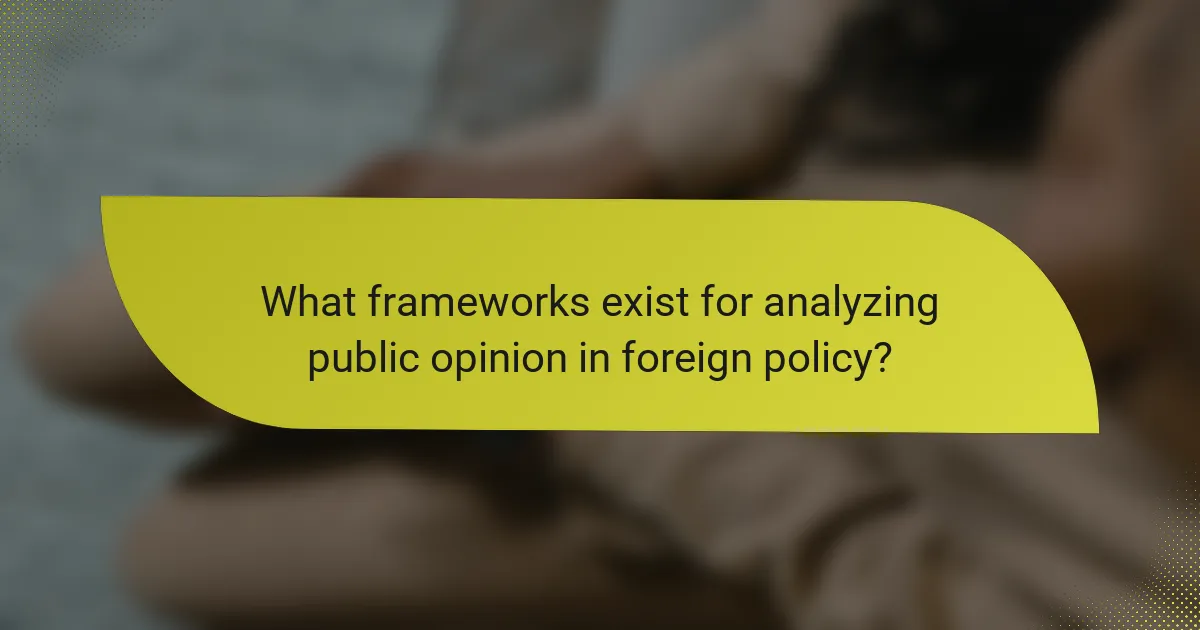
What frameworks exist for analyzing public opinion in foreign policy?
Frameworks for analyzing public opinion in foreign policy include various models and comparative approaches that help understand how citizens perceive and influence international relations. These frameworks assess factors such as political culture, media influence, and public engagement, providing insights into the decision-making process of governments.
Models of public opinion analysis
Models of public opinion analysis often focus on the relationship between individual beliefs and broader societal trends. Common approaches include the spiral of silence, which suggests that individuals may withhold their opinions if they perceive them to be in the minority, and the agenda-setting theory, which posits that media coverage shapes public priorities. Understanding these models can help policymakers gauge the potential impact of public sentiment on foreign policy decisions.
Another useful model is the public opinion polling framework, which employs surveys to quantify attitudes toward specific foreign policy issues. Polls can reveal shifts in public opinion over time, allowing for timely adjustments in diplomatic strategies. However, reliance on polls requires careful consideration of sample size and demographic representation to ensure accuracy.
Comparative frameworks across nations
Comparative frameworks for analyzing public opinion in foreign policy highlight differences in how various countries perceive international issues. For instance, European nations may prioritize multilateralism and diplomacy, while some countries may lean towards unilateral actions based on national interests. These differences can significantly influence international negotiations and alliances.
Additionally, cultural factors play a crucial role in shaping public opinion across nations. In countries with strong historical ties to specific regions, public sentiment may be more favorable towards certain foreign policies. Understanding these cultural nuances can aid diplomats in crafting messages that resonate with the public in different countries, ultimately fostering better international relations.
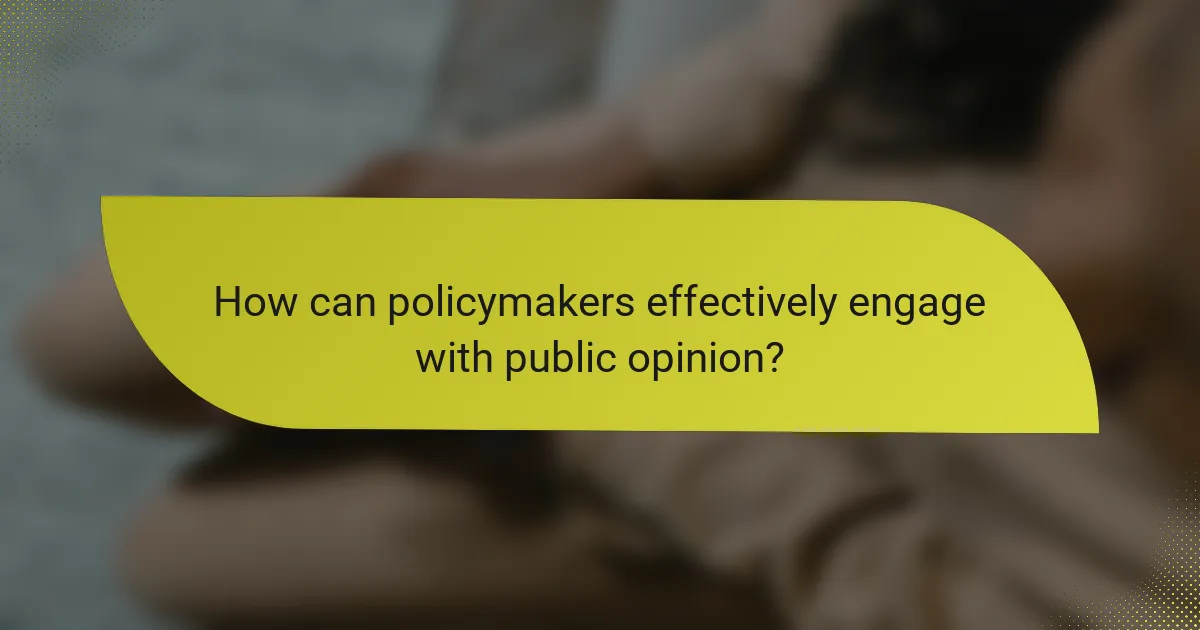
How can policymakers effectively engage with public opinion?
Policymakers can effectively engage with public opinion by actively listening to constituents and incorporating their feedback into foreign policy decisions. This involves transparent communication and utilizing various platforms to gauge public sentiment and foster dialogue.
Strategies for public engagement
Effective strategies for public engagement include utilizing social media platforms, hosting town hall meetings, and conducting surveys to gather opinions. Engaging with diverse community groups can also help ensure that a wide range of perspectives is considered in policy formulation.
Policymakers should prioritize clear messaging and transparency in their communications. Providing accessible information about foreign policy decisions and their implications can help demystify complex issues and encourage informed public discourse.
Examples of successful communication campaigns
One notable example is the U.S. State Department’s “Share America” initiative, which uses digital storytelling to promote American values and policies globally. This campaign effectively engages audiences by presenting relatable narratives that resonate with public interests.
Another example is the UK’s “Great” campaign, which showcases British culture and innovation to strengthen international relationships. By highlighting positive aspects of the nation, this campaign successfully enhances public perception and support for foreign policy initiatives.

What emerging trends are influencing public opinion on national security?
Public opinion on national security is increasingly shaped by rapid technological advancements and shifting societal values. These trends reflect a growing emphasis on transparency, inclusivity, and the role of digital communication in shaping perceptions of safety and diplomacy.
Impact of social media on perceptions
Social media platforms have transformed how individuals receive information about national security issues. News spreads quickly, often leading to immediate public reactions that can influence policy decisions. This immediacy can create a sense of urgency, prompting governments to respond swiftly to public sentiment.
Moreover, social media allows for diverse voices to emerge, giving rise to grassroots movements that challenge traditional narratives. For instance, hashtags related to security issues can mobilize public opinion and pressure policymakers to reconsider their stances.
Shifts in generational attitudes towards diplomacy
Younger generations tend to favor diplomatic solutions over military interventions, reflecting a broader preference for collaboration and multilateralism. This shift is evident in how younger voters prioritize climate change, human rights, and global cooperation in discussions about national security.
As these generational attitudes evolve, policymakers must consider the implications for foreign policy. Engaging with younger constituents through forums and discussions can help bridge the gap between traditional approaches and contemporary expectations for diplomacy.
